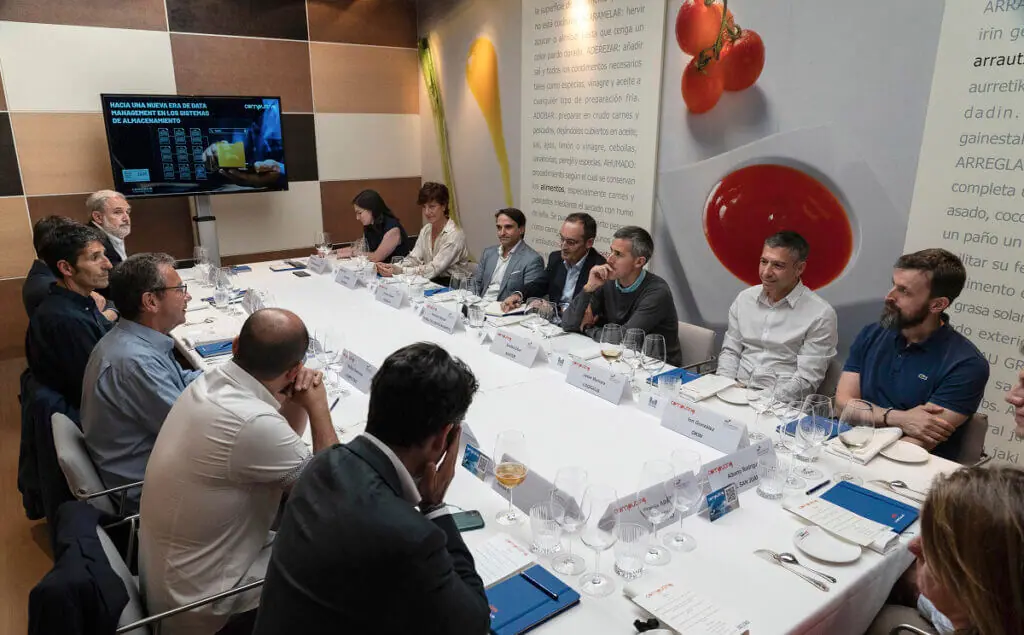04.09.2023
Ion González, CIO of OKIN, shares his insights on cybersecurity at the Computing event in Bilbao

In the new era of data management, it is essential to establish a plan and manage data from collection to transformation, distribution, and consumption.
The streetlights of Bilbao, adorned with jerseys and signs reading 'Ongi eTOURri,' a nod to the Tour de France that had the Basque Country city as its starting point, welcomed the Computing event in the Nervión city on the new era of data.
Companies have become aware of the importance of data management as it is the source of value and a differentiator from the competition. Therefore, during the executive lunch organized with Logicalis, the main topic discussed was the new era of Data Management. Data management is crucial for companies of any size, especially when dealing with large amounts of information. In this regard, Ion González, CIO of Grupo Gourmet Okin, emphasized the importance of having a data architecture aligned with IT needs.
In the new era of Data Management, it is essential to manage data from collection to transformation, distribution, and consumption. Therefore, it is advisable to establish a plan and consider incorporating artificial intelligence to implement the entire architecture.
Endika Eibar, IT manager at Kaefer, saw the elaboration of a solid strategy as the starting point to manage each piece of data properly. "It is necessary to differentiate what is critical for you, for the business, and for the customers," said Eibar from Kaefer; speed in data retrieval requirements is what has driven them to the cloud.
According to Virginia Albizuri, data manager at ITP Aero, "data is vital, but it is crucial to know where to locate it and control its durability." Many companies make the mistake of storing irrelevant information, leading to increased costs without a positive impact.
Alberto Rodríguez, Director of Informatics at Hospital San Juan de Dios, argued that the focus in companies should be on the data lifecycle: "It is essential to raise awareness among users and control who accesses, when, for how long, how it is recovered...". Rodríguez also advocated for outsourcing data with control, especially when dealing with high-level data that attracts hackers.
César González, IT manager at Estampaciones Mayo, shared that the priority is to understand why they store the information they have: "We need to work to extract value from the data and reduce latency."
In the healthcare sector, there is a growing dichotomy in data ownership. Due to the globalization of information, "patients are starting to demand data, and companies have considered it their property until now, but there is an evolution towards Open Data and Open Government," said Iratxe Ijalba, Director of Information Systems at Mutualia. At this point, Alberto Rodríguez emphasized that there is no standard for data quality in the healthcare sector, and the value of data is subjective.
The criticality of data is important to prevent attacks. However, Norberto Ojinaga, Director of Technological Solutions at Euskaltel, argued that the main challenge in data is establishing the perimeter of access points.
Miguel Sanz, IT manager at Focke Meler Gluing Solutions, stated that the perimeter has expanded, requiring more investment, and now a hybrid mindset is needed to raise awareness across the team, whether working in the office, at home, or in any department.
Data Cybersecurity
When talking about data, it is inevitable to link it to cybersecurity. In recent years, the number of ransomware attacks has increased, and when hackers affect an institution, the responsible parties allocate resources to improve cybersecurity.
"We have fire evacuation plans, but not for cyberattacks," stated Iratxe Ijalba. The Mutualia systems director mentioned that her company had started conducting drills to see how they reacted to a hack and whether they were prepared.
Iker Pinillos, Director of Digital Transformation at Elaborados Naturales Benis Food, said they conducted their attacks to see if workers were following security protocols. "In cybersecurity, there are those who have been attacked and those who are yet to be attacked," he added.
This idea was supported by César González: "Everyone has been attacked; it's another thing whether they have managed to penetrate."
Ion González took the debate further, stating that "it is a state problem." According to the Okin Information Systems Director, the cybersecurity issue is at the same level as public safety, and he believes that there will be a figure, similar to the police, for Internet security issues at some point, moving beyond being solely a concern of company IT departments.
Virginia Albizuri also supported this idea because the data obtained by cybercriminals is "necessary for the State." She indicated that "cybersecurity is seen as a CISO problem, but this will change and become a state and European issue because it is terrorism."
Within companies, sensitive information is handled, and often attacks result from employees' carelessness. In this regard, Miguel Sanz questioned how to control this data.
In response, Albizuri introduced the concept of data empathy: "We must think that what I don't want for myself, I don't want for others," aiming to raise awareness among workers. Data empathy also opens the door to sharing information with others, a view shared by Juan Iraola of Baskonia-Alavés, who advocated for sharing data to improve predictions.
Pinillos argued that "overprotecting data causes security paralysis," and to avoid it, González suggested categorizing information to "see what needs protection and what doesn't. We must have the courage to know where to set barriers and where not to."
AI, indispensable in data
Attendees at the Computing-organized meeting in Bilbao saw artificial intelligence as inseparable from data management. During the event, they attempted to make predictions about where it was heading, but they concluded that everything was speculation. What they were certain about, however, is that data cannot be understood without artificial intelligence.
César González raised the question of how to determine the risks of this technology. Iratxe Ijalba shared that the problem lies in uploading information. "The moment you give a piece of data to AI, that data is no longer within your organization. That's why the key is not to upload confidential information; it is advisable to simply ask it questions."
When value is given to data and AI is used for its management, people who traditionally handled this function can perform other tasks that contribute more to the company. AI can bring benefits to companies, but to achieve that, it would be necessary to work based on objectives rather than time, they emphasized.
Source: Mercedes Rodríguez www.computing.es









